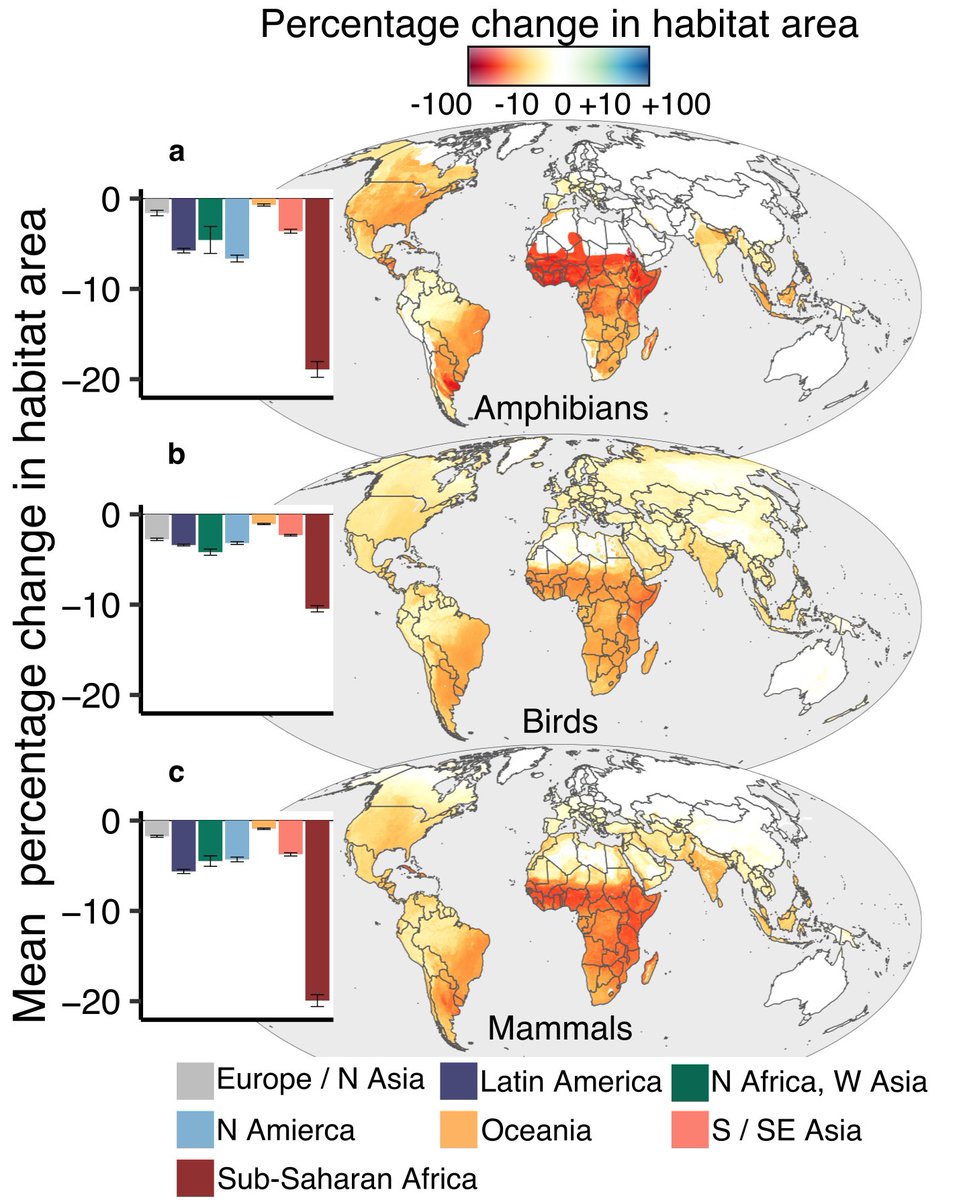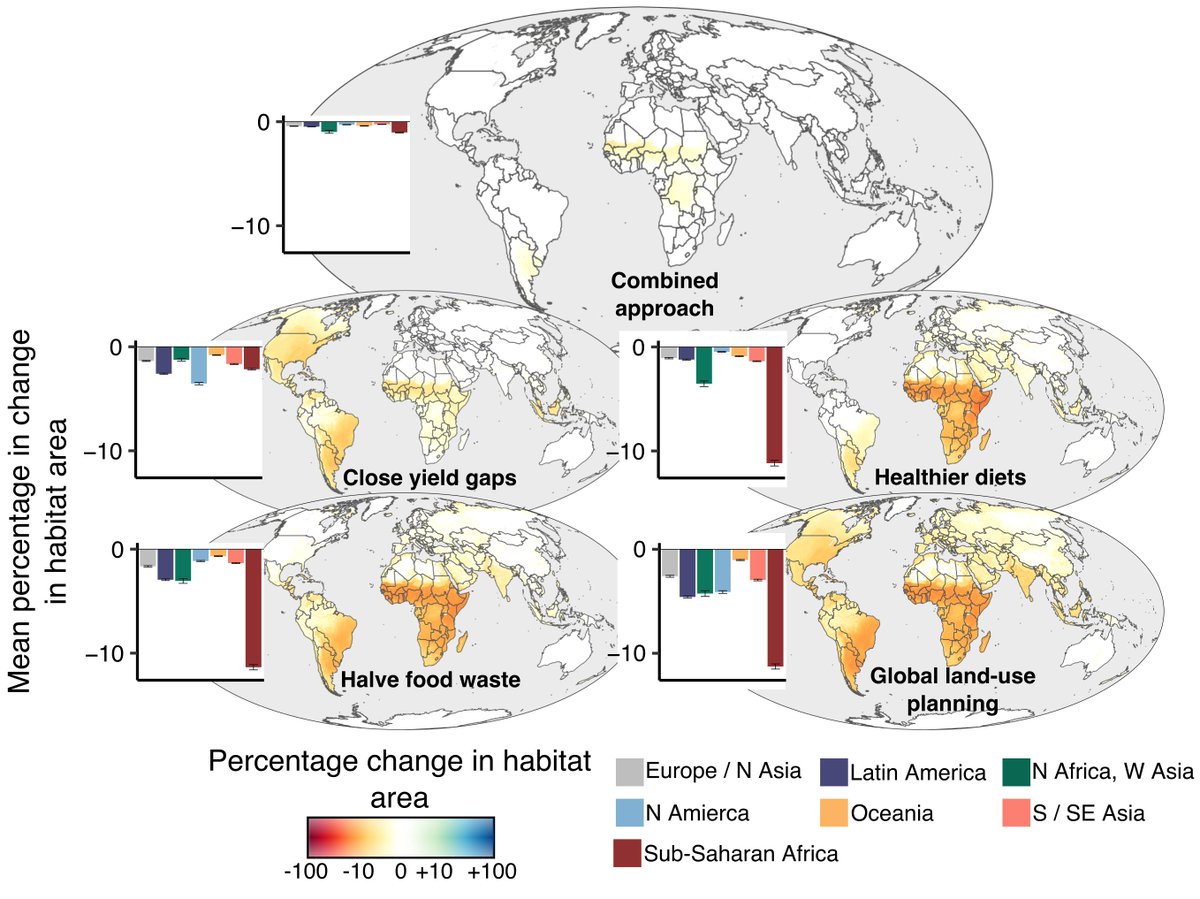Amidst the horror of the late-2020 UK, I've got some #GoodNews to share! Alongside some #BadNews for #biodiversity and #conservation. So buckle up for some hot-off-the-press science from @UniversityLeeds @RSPBScience @oxmartinschool @naturesustainab
https://www.nature.com/articles/s41893-020-00656-5
1/
https://www.nature.com/articles/s41893-020-00656-5
1/
TLDR: we projected that ~88% of the 20,000 #species we looked at will lose habitat to farmland by 2050, and ~1300 will lose 25% (a QUARTER!) of their remaining habitat. This is #badnews and could hugely increase #extinction risks. 2/ https://www.nature.com/articles/s41893-020-00656-5
BUT with proactive #conservation actions we can eliminate losses! Increasing agricultural yields, shifting to healthier diets, reducing food waste, and global-scale land-use planning can, when combined, provide healthy diets for a growing population AND conserve biodiversity 2/
Now for detail: we combined projections of food demand for every country (from #EATLancet) with estimates of agricultural yield increases. This tells us how much land each country is likely to need for feeding it's people and trading food 3/
We estimate we will need 26% more farmland by 2050. That's 3.35 MILLION square kilometres. An area roughly the size of India! And it's unevenly distributed: some European countries may need less land. Many African countries will need much, much more 4/
BUT not all land is equal. To be useful, you need to know where expansion is likely at a really fine spatial scale. So we used #satellitedata at 1.5x1.5 km (that is A LOT of cells across the whole world!) and used past change to estimate where future ag expansion will be 5/
We did this based on where farmland is now, where it has changed recently, how suitable the soil and climate is, and how quickly you can reach large cities to sell your produce https://www.nature.com/articles/s41893-020-00656-5 6/
By combining this probabilistic model with our estimates of total demand, we can then iteratively grow agricultural land across the world in 5-year periods up to 2050 (that's figure 1). As you can see, there is HUGE expansion in Sub-Saharan Africa, but in many other places too 7/
Next, we wanted to know what the impact of this would be on #biodiversity. We overlaid these projections on habitat maps for ~20,000 species of amphibians, birds & mammals, & used species-specific info on whether each can survive in farmland to grow/shrink available habitats 8/
And it's bad news. Real bad. Sub-Saharan Africa, Latin America and tropical Asia could see huge numbers of species lose huge areas of habitat, putting them at serious #extinction risk. That's Figures 2 and 3. It's bleak, even by 2020 standards 9/
So what can we do?! We examined potential impacts of a four different approaches: increasing agricultural yields, shifting to healthier diets, reducing food waste, and global-scale land-use planning. And then combined them all (because why not??) 10/
When we fed these strategies into our projections and repeated the whole process, things looked much, much better: most species still lost small areas of habitat, but only very small areas: only 33 species were projected to lose >25% 11/
And our approach allows us to identify which approaches are likely to have the biggest impact in different parts of the world. Raising yields had the biggest impact overall and OH MY GOODNESS IS IT GOING TO BE IMPORTANT IN AFRICA. 12/
I'd argue that sustainably increasing agricultural yields is one of the most important #conservation actions for the next few decades. Without it, many countries will need to massively expand farmland to maintain food security, and this will have a big cost for #biodiversity 13/
But, yield increases are far less important in N America or Europe. Here we have high yields but REALLY unsustainable diets. So we need to shift these to include fewer empty calories and less meat/dairy. 14/
We hope that our approach allows policymakers/conservationists to understand a) How bad things could be for specific species and landscapes, at a scale that is meaningful for making decisions b) What specific strategies are likely to be most beneficial 15/
It also allows #conservationists to identify species that might need particular help, or where #protectedareas could bring particular benefits. Specific planning will need downscaled projections, but our models and code are #opensource & flexible and can be readily adapted 16/
It also highlights that #conservationists need to be concerned with these underlying threats/ultimate drivers of extinction risk (shout out to https://conbio.onlinelibrary.wiley.com/doi/pdf/10.1111/conl.12720). Tackling these can bring huge benefits, and failing to will make conservation almost impossible 17/
These points have been made before (most recently by the SPECTACULAR paper by @Leclere_David et al: https://www.nature.com/articles/s41586-020-2705-y), but we think our flexible, species-specific approach and examining individual interventions in specific landscapes will help on-the-ground planning 18/
This was, of course, a huge group effort from @oxmartinschool @RSPBScience @carlo_rondinini @brenucsb @UMNews @f_ficetola.
Hopefully of interest to @waiterich @d_christianrose @GlobalEcoGuy @NRamankutty 19/19
Hopefully of interest to @waiterich @d_christianrose @GlobalEcoGuy @NRamankutty 19/19

 Read on Twitter
Read on Twitter



